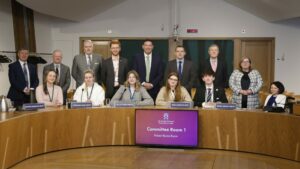To speak or not to speak? Too often, young people find the Children’s Hearing System (CHS) too intimidating to speak up. We having been working with the Scottish Government to help improve this.
The CHS in Scotland should be reviewed in order to better protect children and young people in Scotland, and have their Article 12 UNCRC rights upheld. The Children’s Hearings System helps children and young people in Scotland under the age of eighteen who may be experiencing some problems in their lives. It should be consistent throughout the 32 local authorities and constructed in a way that best suits the young person, as many of our young people are unable to speak up because the environment in which they are expected to might scare or discourage them from doing so.
If we want young people across the country to honestly and confidently express their views through a hearing, we must make sure that SYP’s recent #WhatsYourTake survey and consultation workshop findings from October 2019, as well as similar work ongoing or completed, is used as a reference point when authorities consider how best the system could be developed. Our consultation received 817 responses, of which 86% were from young people who are at school, and 90% aged 12-17. These responses were diverse, particularly including young people from a care experienced background.
We found that hearings are not always designed to meet the needs of the young people who participate in them. When asked how these interview spaces should look, respondents explained that each individual might have different preferences as to what makes them feel comfortable, and they should be asked beforehand.
However, generally they preferred a homely and familiar environment (with comfortable, colourful furniture such as sofas, beanbags and blankets) would make them feel more at ease to engage in open discussion. Crucially, there should be an opportunity to leave the room to go to a safe space at any point for a break.
We asked young people with direct experience of the CHS: how could the system be better equipped to listen to young people’s experiences? 9% of respondents felt that a face-to-face interview was most suitable. 10% opted for a questionnaire (digital or paper). 11% thought that anonymously sharing their views would be the most efficient method.
Clearly, our young people understand that in order to effectively give testimony at a hearing, there should be a range of options of how we want to express those views. This would then tailor the CHS around the young person involved, and will help the child speak their truth which will better inform the decision-making affecting them. These considerations also allow us to be mindful of additional support needs (such as mental health or invisible disabilities), which prevent young people from being able to speak up.
The child should feel in control, be given time to speak, and jargon should be avoided. A good way to check the child understands the purpose of the interview is for them to repeat the purpose back to the interviewer in their own words. Interviewers should be kind, familiar to the young person, make the child feel safe and should be impartial under the circumstances.
The fact of the matter is this: if we expect our young people to speak up for the sake of justice, then they should expect the justice system to work for them. This can only happen when the necessary steps have been taken to ensure that our procedures to administer law can be better tailored to the young person’s individual needs.


